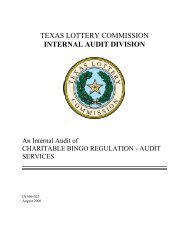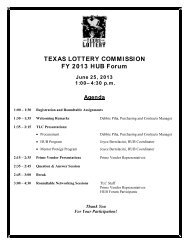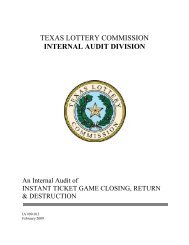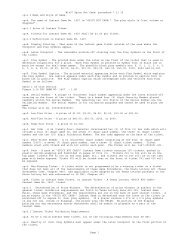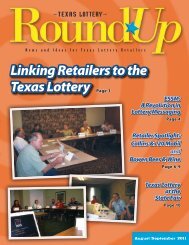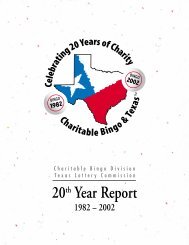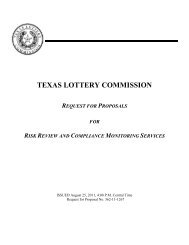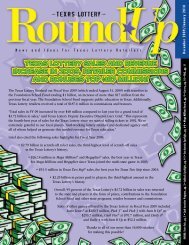Internal Audit of Retailer Accounts - Texas Lottery
Internal Audit of Retailer Accounts - Texas Lottery
Internal Audit of Retailer Accounts - Texas Lottery
Create successful ePaper yourself
Turn your PDF publications into a flip-book with our unique Google optimized e-Paper software.
TEXAS LOTTERY COMMISSION<br />
INTERNAL AUDIT DIVISION<br />
An <strong>Internal</strong> <strong>Audit</strong> <strong>of</strong><br />
RETAILER ACCOUNTS<br />
IA #09-020<br />
October 2009
<strong>Texas</strong> <strong>Lottery</strong> Commission<br />
<strong>Internal</strong> <strong>Audit</strong> Division<br />
<strong>Retailer</strong> <strong>Accounts</strong><br />
TABLE OF CONTENTS<br />
EXECUTIVE SUMMARY ......................................................................................................................................... 1<br />
PROCESS OVERVIEW ............................................................................................................................................. 2<br />
DETAILED REVIEW RESULTS .............................................................................................................................. 3<br />
1. <strong>Retailer</strong> <strong>Accounts</strong> Sweep Process ................................................................................................................... 3<br />
2. <strong>Retailer</strong> Adjustments ....................................................................................................................................... 5<br />
3. Processing <strong>of</strong> Non-Sufficient Funds (NSFs) and Collections Process ............................................................ 6<br />
4. Tools for Protecting the State .......................................................................................................................... 7<br />
a) Pooled Bond Fund ............................................................................................................................ 8<br />
b) Financial Securities .......................................................................................................................... 8<br />
ADDITIONAL ITEMS ............................................................................................................................................. 13<br />
1. Agency Bad Debt Collections Policy and Rule ............................................................................................. 13<br />
2. Agency Bad Debt Write Off Policy ............................................................................................................... 14<br />
3. Reporting <strong>of</strong> Financial Securities .................................................................................................................. 14<br />
AUDIT PURPOSE, SCOPE AND METHODOLOGY .......................................................................................... 15<br />
October 2009 i IA # 09-020
<strong>Texas</strong> <strong>Lottery</strong> Commission<br />
<strong>Internal</strong> <strong>Audit</strong> Division<br />
<strong>Retailer</strong> <strong>Accounts</strong><br />
This page intentionally left blank.<br />
October 2009 ii IA # 09-020
<strong>Texas</strong> <strong>Lottery</strong> Commission<br />
<strong>Internal</strong> <strong>Audit</strong> Division<br />
<strong>Retailer</strong> <strong>Accounts</strong><br />
EXECUTIVE SUMMARY<br />
In Fiscal Year 2008, the <strong>Texas</strong> <strong>Lottery</strong> Commission (TLC) generated over $3.6 billion through<br />
instant ticket and online game sales. The <strong>Texas</strong> <strong>Lottery</strong> Commission collects this revenue from<br />
its licensed retailers through a weekly sweep <strong>of</strong> the lottery retailers’ bank accounts. The weekly<br />
sweep is performed to ensure timely deposit <strong>of</strong> retailer sales revenue and to reimburse retailers<br />
for funds owed to them for commissions earned on sales and for cashing winning tickets. In<br />
Fiscal Year 2008, on average $30 million was swept each week from licensed retailer bank<br />
accounts totaling over $1.5 billion for the fiscal year.<br />
The objective <strong>of</strong> this audit was to evaluate the adequacy and effectiveness <strong>of</strong> internal controls for<br />
ensuring accurate and efficient retailer collections and adjustments. A secondary objective was to<br />
evaluate the tools in place to protect the State from monetary loss in the event <strong>of</strong> retailer nonpayment.<br />
Overall, based on the results <strong>of</strong> our review and testing, controls provide reasonable assurance<br />
that the retailer sweep is performed accurately, retailer adjustments are made accurately and in<br />
accordance with agency policies and procedures, and the collection <strong>of</strong> non-sufficient funds<br />
(NSFs) is performed in a timely manner. We present management recommendations to<br />
strengthen controls and improve current processes. Additionally, opportunities may exist to<br />
further manage and minimize the State’s risk <strong>of</strong> loss.<br />
<strong>Internal</strong> <strong>Audit</strong> would like to express our appreciation to the <strong>Lottery</strong> Operations Division, the<br />
Information Resources Department, and the Office <strong>of</strong> the Controller for their cooperation and<br />
assistance during this engagement. Their courtesy and responsiveness extended to <strong>Internal</strong> <strong>Audit</strong><br />
allowed us to complete our work effectively and efficiently.<br />
October 2009 1 IA # 09-020
<strong>Texas</strong> <strong>Lottery</strong> Commission<br />
<strong>Internal</strong> <strong>Audit</strong> Division<br />
<strong>Retailer</strong> <strong>Accounts</strong><br />
PROCESS OVERVIEW<br />
After a retailer application is approved, GTECH provides the licensed retailer with a terminal at<br />
the retailer’s premises to conduct lottery business. The terminal records transactions that are<br />
initiated at licensed retailer locations and provides information to retailers about their accounts.<br />
The licensed retailers’ transactions are then transferred in near-real time from ProSys, GTECH’s<br />
gaming system s<strong>of</strong>tware, to the <strong>Internal</strong> Control System (ICS).<br />
ICS is an automated audit tool developed by Elsym<br />
Consulting, GTECH’s vendor, used to verify that lottery<br />
transactions have been properly processed. For each<br />
processing day, transactions by licensed retailers are<br />
totaled separately by ProSys and ICS. The transactions<br />
must be produced on ICS with the exact same results as<br />
those generated by the ProSys system. When the results<br />
balance, the <strong>Lottery</strong> has gained assurance that transactions<br />
have been properly transferred and recorded. If the results<br />
do not balance, the discrepancy is researched to determine<br />
the cause. 1 The transactions captured by ProSys are the<br />
basis for recording and maintaining retailer accounts,<br />
including collections or distributions through the weekly<br />
sweep and adjustments to retailer accounts.<br />
Figure 1: <strong>Lottery</strong> Sales Transactions<br />
Sales<br />
(<strong>Retailer</strong>s)<br />
ProSys<br />
(GTech)<br />
The <strong>Texas</strong> <strong>Lottery</strong> Commission does not receive<br />
independent transactions directly from retailers. The <strong>Texas</strong> <strong>Lottery</strong> Commission is reliant upon<br />
GTECH to provide accurate information. <strong>Internal</strong> <strong>Audit</strong>’s review did not include verifying the<br />
reliability and integrity <strong>of</strong> the data from ProSys used to determine the retailers’ weekly sweep<br />
amounts. We relied upon other audit work as relevant and appropriate. 2<br />
ICS<br />
(Elsym)<br />
Weekly EFT File<br />
(TLC)<br />
1 GTECH Proposal for <strong>Lottery</strong> Operations and Services, June 2001.<br />
2 <strong>Texas</strong> <strong>Lottery</strong> Commission <strong>Internal</strong> <strong>Audit</strong> <strong>of</strong> Sales Reporting, Project No. 06-010, December 2005 and GTECH<br />
<strong>Texas</strong> Report on Controls Placed in Operation and Tests <strong>of</strong> Operating Effectiveness, September 16, 2008.<br />
October 2009 2 IA # 09-020
<strong>Texas</strong> <strong>Lottery</strong> Commission<br />
<strong>Internal</strong> <strong>Audit</strong> Division<br />
<strong>Retailer</strong> <strong>Accounts</strong><br />
DETAILED REVIEW RESULTS<br />
The objective <strong>of</strong> our audit was to evaluate the adequacy and effectiveness <strong>of</strong> internal controls in<br />
place to ensure accurate and efficient retailer collections and adjustments. In completing our<br />
objective, <strong>Internal</strong> <strong>Audit</strong> performed a reconciliation <strong>of</strong> the retailer sweep to net sales reported for<br />
the week ending February 14, 2009, and reconciled retailer commissions to net sales reported.<br />
<strong>Internal</strong> <strong>Audit</strong> also reviewed adjustments to retailer accounts, the collections process <strong>of</strong> retailer<br />
accounts that were no longer in a sweepable status, and the processing <strong>of</strong> non-sufficient funds<br />
(NSFs.) In addition, we reviewed the use <strong>of</strong> the pooled bond fund and the retailer financial<br />
securities, two tools used to protect the State from monetary losses.<br />
The results <strong>of</strong> our review are presented below.<br />
1<br />
<strong>Retailer</strong> <strong>Accounts</strong> Sweep Process<br />
Transactions 3 by licensed retailers are captured by the ProSys system. The transactions are<br />
totaled separately by ProSys and ICS and then reconciled to ensure accuracy. Weekly, ICS<br />
creates an Electronic Funds Transfer (EFT) file that is sent to the Comptroller <strong>of</strong> Public<br />
<strong>Accounts</strong> in order to deposit or withdraw funds from<br />
each active licensed retailer’s account. This process How is the Weekly <strong>Retailer</strong> Sweep<br />
is referred to as the weekly retailer sweep. The<br />
Calculated?<br />
sweep process is entirely automated and overlaps<br />
divisions within the agency. The <strong>Lottery</strong> Operations<br />
division is responsible for the accounting <strong>of</strong><br />
individual retailer accounts and relies on GTECH’s<br />
ProSys system for individual retailer account<br />
information. The Office <strong>of</strong> the Controller is<br />
responsible for reporting the aggregate <strong>of</strong> the retailer<br />
accounts and relies on ICS for financial information<br />
that is populated into the agency’s financial system,<br />
<strong>Retailer</strong> Net Sales<br />
- Ticket Validations (Prizes Paid)<br />
- Commissions<br />
+ Fees or Penalties Assessed, if any<br />
+/- Prior Weeks Activity, if any<br />
Net Weekly <strong>Retailer</strong> Sweep Amount<br />
MIP. Both divisions rely solely on the automated process for accurate sweep amounts.<br />
However, each division relies on separate systems to accomplish their objectives. This<br />
highlights the need to ensure a complete understanding <strong>of</strong> both automated systems and business<br />
processes. Additionally, business rules that drive the retailer sweep have not been completely<br />
documented. This may leave the agency vulnerable as reliance is placed on institutional<br />
knowledge and established system coding.<br />
To evaluate the accuracy <strong>of</strong> the automated sweep process, <strong>Internal</strong> <strong>Audit</strong>, 1) reviewed the end <strong>of</strong><br />
year reconciliation <strong>of</strong> accounts receivable performed by the Office <strong>of</strong> the Controller for Fiscal<br />
Year 2008, and 2) sought to reconcile the retailer sweep to the reported net sales for the week<br />
ending February 14, 2009. The result <strong>of</strong> the Office <strong>of</strong> the Controller’s reconciliation <strong>of</strong> accounts<br />
3 Transactions include lottery sales, validations, instant ticket returns, retailer commissions and adjustments.<br />
October 2009 3 IA # 09-020
<strong>Texas</strong> <strong>Lottery</strong> Commission<br />
<strong>Internal</strong> <strong>Audit</strong> Division<br />
<strong>Retailer</strong> <strong>Accounts</strong><br />
receivable between the Weekly <strong>Retailer</strong> Settlement Report and the internal accounting system for<br />
Fiscal Year 2008 was within their acceptable range. 4<br />
<strong>Internal</strong> <strong>Audit</strong> reconciled the retailer sweep to reported net sales for the week ending February<br />
14, 2009. In performing this reconciliation, <strong>Internal</strong> <strong>Audit</strong> had to rely upon institutional<br />
knowledge from the Information Resources department and from Elsym Consulting. Elsym<br />
provided ICS system documentation regarding the aggregate retailer account detail needed to<br />
reconcile the total sweep amount.<br />
While information is readily available in ProSys for the weekly sweep amount for each<br />
individual retailer, the aggregate amount swept each week had to be ascertained through direct<br />
conversations with Elsym Consulting who reviewed system coding for the EFT file created by<br />
ICS. In some instances, <strong>Internal</strong> <strong>Audit</strong> could only rely upon the coding in the ICS automated<br />
system obtained from Elsym as the business process <strong>of</strong> record.<br />
For example, in order to perform the reconciliation <strong>of</strong> the sweep amount, <strong>Internal</strong> <strong>Audit</strong><br />
performed a reconciliation <strong>of</strong> the commissions paid to the reported net sales to ensure accurate<br />
commissions are being paid to retailers. <strong>Internal</strong> <strong>Audit</strong> was initially unable to reconcile the<br />
retailer commissions, 5% <strong>of</strong> reported net sales, because <strong>of</strong> differences resulting from Pick 3 and<br />
Daily 4 commissions and free/promotional ticket commissions.<br />
In <strong>Internal</strong> <strong>Audit</strong>’s initial meetings with responsible staff, there was not a consensus on the<br />
treatment <strong>of</strong> commissions for all types <strong>of</strong> promotions resulting in free tickets. With contradicting<br />
information provided and no TLC documentation on commission payments for free/promotional<br />
tickets, <strong>Internal</strong> <strong>Audit</strong> relied upon the coding in the ICS automated system as the business<br />
process <strong>of</strong> record. Additionally, while researching the treatment <strong>of</strong> commissions for coupon<br />
promotions, we found one case in which validation parameters in ProSys allowed for an expired<br />
coupon to be redeemed. While this particular incident does not pose a significant risk ($336 in<br />
free tickets and $16.80 in commissions paid from expired coupons) and would not likely have<br />
been discovered during the ordinary processing and management <strong>of</strong> the retailer sweep, both<br />
examples illustrate the need for improved coordination between the divisions to ensure that<br />
intended results are achieved.<br />
To reconcile Pick 3 and Daily 4 commissions, <strong>Internal</strong> <strong>Audit</strong> received the total sales from<br />
Information Resources for all retailers with sales ending in fifty cents for the test week. This is<br />
because both the Pick 3 and Daily 4 games can have wagers <strong>of</strong> 50 cents. With commissions <strong>of</strong><br />
5%, this results in a rounding <strong>of</strong> commissions by half a cent (i.e., five percent <strong>of</strong> 50 cents is 2.5<br />
cents, which is then rounded up to 3 cents in favor <strong>of</strong> the retailers). For our test week, this<br />
rounding resulted in the <strong>Lottery</strong> paying retailers an additional $64. This half cent payment is by<br />
design and in accordance with current payment practice for retailer commissions.<br />
As recommended in the <strong>Internal</strong> <strong>Audit</strong> <strong>of</strong> Sales Reporting, IA #06-010, issued December 2005,<br />
corrections have been made in the ICS programming to account for miscellaneous credits in the<br />
general ledger. However, as previously reported, policies that drive how the ProSys and ICS<br />
systems calculate and apply retailer commissions to retailer accounts have not yet been<br />
documented.<br />
4 <strong>Texas</strong> <strong>Lottery</strong> Commission Procedure OC-GL-019, <strong>Accounts</strong> Receivable Reconciliation, Effective Date 6/3/09.<br />
October 2009 4 IA # 09-020
<strong>Texas</strong> <strong>Lottery</strong> Commission<br />
<strong>Internal</strong> <strong>Audit</strong> Division<br />
<strong>Retailer</strong> <strong>Accounts</strong><br />
Recommendation:<br />
<strong>Internal</strong> <strong>Audit</strong> recommends the agency:<br />
1. Ensure documentation is created and maintained for all business rules related to the<br />
automated sweep process, the payment policies for commissions on free tickets,<br />
adjustments, and any other relevant areas. The documentation should clearly state the<br />
policy decisions that drive the process. For example, the policy to round up the<br />
commissions paid for fifty cent wagers for Pick 3 and Daily 4 should be documented in<br />
the s<strong>of</strong>tware requirements specification. Process owners, both in the Office <strong>of</strong> the<br />
Controller and <strong>Lottery</strong> Operations, should be responsible for sign-<strong>of</strong>f on system<br />
documentation and the creation <strong>of</strong> corresponding procedures. Process owners should<br />
further verify that changes to business processes are documented and the impact to the<br />
automated system, both financial and accounting, is detailed in the system change<br />
documentation.<br />
Management Response:<br />
Management agrees with the recommendation. The Information Resources Analyst responsible<br />
for coordinating system changes affecting the automated sweep process will ensure that the<br />
corresponding business rules have been clearly documented; reviewed and approved by the<br />
respective business owners (Office <strong>of</strong> the Controller/<strong>Lottery</strong> Operations). Such documentation<br />
will be maintained by the Information Resources Department including appropriate sign-<strong>of</strong>fs.<br />
Information Resources will develop and implement procedures that detail the process for<br />
documenting changes to the automated sweep process to include any associated policy<br />
directives. This procedure will be in place September 1, 2009.<br />
2<br />
<strong>Retailer</strong> Adjustments<br />
In order to receive credit for various reasons, including misprinted or damaged tickets or tickets<br />
disputed by lottery players, retailers submit a <strong>Texas</strong> <strong>Lottery</strong> <strong>Retailer</strong> Request for Adjustment<br />
form. These forms and related tickets are processed in the claim center and entered into the<br />
Automatic Claims Tracking System (ACTS). <strong>Retailer</strong> Services picks up the forms and tickets<br />
from the mail room, reviews the request and determines the appropriate amount <strong>of</strong> the<br />
adjustment based on the information submitted by the retailer. A separate individual enters the<br />
adjustment into ProSys and a person independent <strong>of</strong> the transaction entry verifies the adjustment.<br />
ProSys generates a daily <strong>Retailer</strong> Adjustment Report which shows the detail for all adjustments<br />
made for each retailer. <strong>Retailer</strong> Services management reviews this report for unusual<br />
transactions. In addition, <strong>Retailer</strong> Services management has created an exception report that<br />
notifies management <strong>of</strong> any adjustment amounts that exceed a pre-determined threshold.<br />
Based on risk, <strong>Internal</strong> <strong>Audit</strong> focused its review efforts on the retailer adjustments that were not<br />
system generated 5 . <strong>Internal</strong> <strong>Audit</strong> reviewed the adjustments made for the week ending February<br />
5 System-generated adjustments are those made automatically to retailer accounts resulting from NSFs or manual<br />
sales adjustments. These are interest and penalty charges resulting from NSFs, and adjustments to retailers’<br />
commissions resulting from manual sales adjustments.<br />
October 2009 5 IA # 09-020
<strong>Texas</strong> <strong>Lottery</strong> Commission<br />
<strong>Internal</strong> <strong>Audit</strong> Division<br />
<strong>Retailer</strong> <strong>Accounts</strong><br />
14, 2009. For the period reviewed, there were 240 non-system generated retailer adjustment<br />
transactions on the <strong>Retailer</strong> Adjustment Reports. These transactions included adjustments for<br />
manual payments <strong>of</strong> NSFs, sales, instant ticket validations, and bank returns.<br />
The majority <strong>of</strong> the reviewed adjustments were made to sales and for manual payments <strong>of</strong> NSFs.<br />
Sales adjustments made up the majority <strong>of</strong> the number <strong>of</strong> transactions, while manual payments <strong>of</strong><br />
NSFs accounted for the majority <strong>of</strong> the dollar value <strong>of</strong> the total adjustments made for the period.<br />
<strong>Internal</strong> <strong>Audit</strong> verified the data on the <strong>Retailer</strong> Adjustment Reports with the information located<br />
in the <strong>Retailer</strong> Services Document Library in the Document Repository. <strong>Internal</strong> <strong>Audit</strong> also<br />
compared the information from the <strong>Retailer</strong> Adjustment Reports to the <strong>Retailer</strong> Accounting Sub-<br />
System to verify that the transactions matched. All transactions were properly processed with<br />
minor exceptions. No exceptions were found among the manual payments tested.<br />
<strong>Internal</strong> <strong>Audit</strong> also reviewed the length <strong>of</strong> time to process the retailer adjustments. We found<br />
manual payments were entered and posted within a day. Determining the length <strong>of</strong> time to<br />
process retailer sales adjustments was a little more difficult since the date the <strong>Texas</strong> <strong>Lottery</strong><br />
Commission received the <strong>Retailer</strong> Request for Adjustment form was not available in every<br />
instance. To determine the processing time for retailer sales adjustments, <strong>Internal</strong> <strong>Audit</strong><br />
compared the date the <strong>Retailer</strong> Request for Adjustment form was signed by the retailer to the<br />
date the adjustment was entered. Using these parameters, the average time to process retailer<br />
sales adjustments was 27 days 6 . <strong>Retailer</strong> Services is meeting its goal <strong>of</strong> processing adjustments<br />
within 4 – 6 weeks <strong>of</strong> receipt.<br />
Overall, our testing revealed that adequate and effective controls are in place to ensure that nonsystem<br />
generated retailer adjustments are properly made, entered, reviewed and approved.<br />
3<br />
Processing <strong>of</strong> Non-Sufficient Funds (NSFs) and Collections<br />
Process<br />
A “bank return” occurs if the total amount due is not available when the EFT system sweeps the<br />
retailer’s account. The retailer is informed that their account had insufficient funds to cover the<br />
sweep amount and is instructed to remit payment in order to avoid license suspension. If<br />
payment is not made within the required timeframe, the retailer’s license is suspended; and any<br />
lottery terminal linked to their retailer number is disabled. In addition, the retailer is subject to a<br />
penalty (5 percent <strong>of</strong> total amount due) and a $25 fee. 7<br />
Information Resources provides <strong>Retailer</strong> Services with a report <strong>of</strong> all retailers with an NSF.<br />
<strong>Retailer</strong> Services reviews each retailer’s status in ProSys, highlights NSF amounts greater than<br />
$10,000 for management to review, and highlights those retailers for which this is their fourth<br />
NSF within a year. <strong>Retailer</strong> Services telephones the retailers on the report that are not in<br />
cancelled or suspended status to inform them that they had an NSF and they must remit payment<br />
to a claim center by a specific date and time or their terminal will be turned <strong>of</strong>f.<br />
6 Our calculation excludes two outliers which had processing times <strong>of</strong> 245 days and 246 days, respectively.<br />
7 <strong>Texas</strong> <strong>Lottery</strong> Commission <strong>Retailer</strong> Guide As <strong>of</strong> August 31, 2008, p. 32.<br />
October 2009 6 IA # 09-020
<strong>Texas</strong> <strong>Lottery</strong> Commission<br />
<strong>Internal</strong> <strong>Audit</strong> Division<br />
<strong>Retailer</strong> <strong>Accounts</strong><br />
<strong>Internal</strong> <strong>Audit</strong> observed <strong>Retailer</strong> Services’ review <strong>of</strong> the NSF report and retailer telephoning. In<br />
addition, <strong>Internal</strong> <strong>Audit</strong> performed a review <strong>of</strong> manual payments <strong>of</strong> NSFs during the adjustments<br />
testing described previously in this report. The process appears to be working as intended and<br />
<strong>Internal</strong> <strong>Audit</strong> did not note any discrepancies.<br />
If payment for an NSF is not made within the required timeframe or the retailer has had four<br />
NSFs within a year, the retailer’s license is suspended and any lottery terminal linked to their<br />
retailer number is disabled. 8 The retailer is then tracked through a separate collections process<br />
and is no longer part <strong>of</strong> the automated sweep process.<br />
In order to ensure outstanding amounts owed are collected, <strong>Retailer</strong> Services has various<br />
collection tools available. These include asset freezes, asset levies, liens and cash register<br />
seizures. In addition, a vendor hold is placed with the <strong>Texas</strong> Comptroller <strong>of</strong> Public <strong>Accounts</strong>,<br />
which prohibits the state from making payments to a retailer with an outstanding debt to the<br />
state. 9<br />
In order to track and actively collect outstanding retailer accounts, <strong>Retailer</strong> Services utilizes<br />
various automated tools. The <strong>Lottery</strong> <strong>Retailer</strong> Management System maintains retailer account<br />
information and generates reports each week that identify retailers that have been cancelled and<br />
are no longer included in the weekly automated sweep process. These reports show the<br />
collection status, the original and current balance owed, and the type <strong>of</strong> collection activity<br />
pursued. In addition, monitoring reports are available that show the status <strong>of</strong> the collection<br />
efforts and the results <strong>of</strong> the collection efforts by assigned staff in <strong>Retailer</strong> Services. According<br />
to <strong>Retailer</strong> Services, the agency’s current practice is to actively pursue an outstanding retailer<br />
account for a minimum <strong>of</strong> 12 months before the debt is certified as bad debt and no longer<br />
actively pursued. For FY 2008 the percentage <strong>of</strong> bad debt to lottery sales was 0.01%.<br />
<strong>Internal</strong> <strong>Audit</strong> reviewed the collection process and monitoring reports available, as well as the<br />
percentage <strong>of</strong> bad debt to lottery sales as reported in the agency’s performance measures.<br />
Based on our review, adequate controls are in place and appear to be working as intended to aid<br />
in the processing <strong>of</strong> non-sufficient funds and in the collections process.<br />
4<br />
Tools for Protecting the State<br />
Per the State <strong>Lottery</strong> Act, the executive director has the same “administrative, enforcement, and<br />
collection powers” 10 <strong>of</strong> the State Comptroller as provided by Chapter 111 <strong>of</strong> the Tax Code. As<br />
such, the <strong>Texas</strong> <strong>Lottery</strong> has several tools and processes in place to protect the State from<br />
monetary loss in the event <strong>of</strong> retailer non-payment.<br />
8 <strong>Texas</strong> <strong>Lottery</strong> Commission <strong>Retailer</strong> Guide As <strong>of</strong> August 31, 2008, p. 32.<br />
9 <strong>Texas</strong> <strong>Lottery</strong> Commission Procedures:<br />
LO-RS-016, Asset Freezes, Effective Date 12/18/07<br />
LO-RS-017, Levies and Releases, Effective Date 1/9/08<br />
LO-RS-019, Filing and Releasing Liens, Effective Date 1/23/08<br />
LO-RS-021, Limited Seizures (Cash Register and/or Cash Box), Effective Date 1/9/08<br />
LO-RS-044, Vendor Holds, Effective Date 1/23/08<br />
10 <strong>Texas</strong> Government Code§466.019<br />
October 2009 7 IA # 09-020
<strong>Texas</strong> <strong>Lottery</strong> Commission<br />
<strong>Internal</strong> <strong>Audit</strong> Division<br />
<strong>Retailer</strong> <strong>Accounts</strong><br />
As part <strong>of</strong> our audit, <strong>Internal</strong> <strong>Audit</strong> sought to evaluate some <strong>of</strong> these tools.<br />
The <strong>Texas</strong> <strong>Lottery</strong> Commission sweeps approximately $1.5 billion per year from retailer<br />
accounts. For fiscal years 2005 through 2008, approximately $2.1 million was written <strong>of</strong>f as<br />
certified bad debt (CBD). This averaged to approximately $500,000 per year. For fiscal years<br />
2007 and 2008, the percentage <strong>of</strong> bad debt to lottery sales reported was 0.01%. This percentage<br />
is an indicator <strong>of</strong> the adequacy and effectiveness <strong>of</strong> the tools and systems in place to protect the<br />
State.<br />
While this percentage is low, opportunities may exist to further manage and minimize the State’s<br />
risk <strong>of</strong> loss.<br />
a) Pooled Bond Fund<br />
The <strong>Texas</strong> <strong>Lottery</strong> Act authorizes the Executive Director to establish a pooled bond fund “to<br />
protect the State from possible losses.” 11 Each new licensee contributes $25 as part <strong>of</strong> their<br />
license fee to the pooled bond fund.<br />
Effective September 1999, the 76 th Legislature reduced the pooled bond fund from the thenbalance<br />
<strong>of</strong> $20 million to a cap <strong>of</strong> $5 million and required the agency to, “…transfer all<br />
pooled reserve fund revenues and balances that exceed $5 million to the Foundation School<br />
Fund” 12 each year. Our review and discussions with the Office <strong>of</strong> the Controller<br />
management indicate that the pooled bond fund is not and has not been utilized by the agency<br />
to <strong>of</strong>f-set losses from uncollectible retailer accounts since at least that time. Rather, those<br />
amounts are written <strong>of</strong>f annually as CBD. Since the pooled bond fund is not utilized, the<br />
balance has remained at its cap and all incoming licensee fees have been accordingly<br />
transferred to the Foundation School Fund (FSF). For fiscal years 2005 through 2008,<br />
approximately $297,000, or an average <strong>of</strong> over $74,000 per year, was transferred to the FSF<br />
from new licenses.<br />
The agency has not established policy or procedures regarding the use <strong>of</strong> the pooled bond<br />
fund. Further, the current practice does not facilitate an examination and analysis <strong>of</strong> the<br />
adequacy <strong>of</strong> amounts needed to protect the State from possible loss. In discussing the need<br />
for each retailer to post a financial security including a contribution to the pooled bond fund,<br />
the State <strong>Lottery</strong> Act states, “The amount <strong>of</strong> the security shall be determined by the executive<br />
director and must reflect the possible losses to the state from the operation <strong>of</strong> the sales<br />
agent.” 13 As stated earlier, an average <strong>of</strong> approximately $500,000 is written <strong>of</strong>f as CBD each<br />
year, while approximately $74,000 is assessed for pooled bond fund contributions each year.<br />
b) Financial Securities<br />
Currently, the <strong>Texas</strong> <strong>Lottery</strong> Commission performs a credit review during the retailer<br />
licensing process. If a potential retailer does not meet certain credit and other criteria, they<br />
are required to furnish a financial security (i.e., Certificate <strong>of</strong> Deposit or other financial<br />
instrument) to protect the State in the event they do not have funds available at the time <strong>of</strong> a<br />
weekly sweep. The amount <strong>of</strong> the financial security is either $5,000 or $10,000 depending<br />
11 <strong>Texas</strong> Government Code §466.156<br />
12 House Bill No.1 Conference Committee Report (General Appropriations Act), 80 th Legislature, 2007<br />
13 <strong>Texas</strong> Government code §456.156(a)<br />
October 2009 8 IA # 09-020
<strong>Texas</strong> <strong>Lottery</strong> Commission<br />
<strong>Internal</strong> <strong>Audit</strong> Division<br />
<strong>Retailer</strong> <strong>Accounts</strong><br />
on the applicant type, certain conditions and credit results. 14 If the retailer does not have any<br />
non-sufficient funds instances (NSFs) for one consecutive year, the <strong>Texas</strong> <strong>Lottery</strong><br />
Commission releases the financial security to the retailer. If the retailer has an NSF, the<br />
period is extended one year from the date <strong>of</strong> the NSF. Financial securities may ultimately be<br />
used to recover delinquent amounts.<br />
The total amount <strong>of</strong> financial securities cashed during fiscal years 2005 through 2008 was<br />
$313,964.10, representing 102 retailers. Certified bad debt for this timeframe was<br />
$2,152,935.49. Of those retailers listed as CBD during this timeframe, 57 had a financial<br />
security on file at some point during their history. Of those, a total <strong>of</strong> 16 retailers had their<br />
financial securities cashed by the <strong>Texas</strong> <strong>Lottery</strong> Commission to satisfy part <strong>of</strong> their debt.<br />
i. Financial Security Amounts<br />
In assessing the adequacy <strong>of</strong> the amount <strong>of</strong> financial security required, <strong>Internal</strong> <strong>Audit</strong><br />
examined the historical redemption <strong>of</strong> securities in comparison to the debt owed by<br />
those retailers. To capture transactions that have completed the collections process,<br />
we narrowed our sample period and examined financial securities cashed in fiscal<br />
years 2005 and 2006. During this time period, the agency cashed financial securities<br />
from 38 retailers, totaling $121,536.30. An additional $114,016.37 was collected<br />
from these retailers, and the total amount written <strong>of</strong>f as uncollectible from these same<br />
retailers was $61,901.70. Thus the percentage <strong>of</strong> debt covered by a financial security<br />
for those retailers who defaulted was 40.86 percent.<br />
<strong>Internal</strong> <strong>Audit</strong> also examined the individual amounts written <strong>of</strong>f as CBD. During the<br />
period fiscal years 2005 through 2008, individual CBD amounts ranged from $1 to<br />
$151,304.48. Sixty-four percent <strong>of</strong> the amounts written <strong>of</strong>f as CBD were $5,000 or<br />
less. An additional 21 percent ranged from $5,001 to $10,000. The remaining 15<br />
percent <strong>of</strong> the individual amounts written <strong>of</strong>f as CBD were over $10,000.<br />
ii. Financial Security Selection Criteria<br />
Of the 347 retailers on the CBD reports for fiscal years 2005 – 2008, 57 had a<br />
financial security on file at some point during their history as a retailer. An additional<br />
92 retailers had financial securities cashed during this period, but did not ultimately<br />
appear on the CBD report. Thus, the ratio <strong>of</strong> retailers from whom a financial security<br />
is required to those who default is 34 percent (149/439).<br />
iii. Financial Security Release Policies<br />
As stated earlier, the agency releases financial securities if the retailer does not have<br />
any NSFs for one consecutive year. <strong>Internal</strong> <strong>Audit</strong> reviewed the length <strong>of</strong> time after a<br />
financial security was released that a retailer defaulted. In fiscal years 2005 – 2008,<br />
41 retailers appeared on the CBD listing that had financial securities released by the<br />
<strong>Texas</strong> <strong>Lottery</strong> Commission. An average <strong>of</strong> 2.02 years elapsed after their financial<br />
security was released until the retailer was cancelled and 3.46 years until the retailer<br />
appeared on the CDB report.<br />
14 Procedure LO-RS-006, Application Pre-Edit and Processing, Appendix B – CD Determination Reference Chart,<br />
Effective Date January 9, 2008.<br />
October 2009 9 IA # 09-020
<strong>Texas</strong> <strong>Lottery</strong> Commission<br />
<strong>Internal</strong> <strong>Audit</strong> Division<br />
<strong>Retailer</strong> <strong>Accounts</strong><br />
iv. Controls over Financial Securities<br />
Recommendation:<br />
If a retailer is required to obtain a financial security, the retailer and their bank<br />
complete the Assignment <strong>of</strong> Security form and submit the approved form and<br />
documentation <strong>of</strong> the financial security to <strong>Retailer</strong> Services. Prior to acceptance,<br />
<strong>Retailer</strong> Services verifies the conformance <strong>of</strong> the completed Assignment <strong>of</strong> Security<br />
form and the financial security documentation against agency specifications. The<br />
financial security documents are maintained in a firepro<strong>of</strong> filing cabinet in a room<br />
with restricted access and constant monitoring.<br />
<strong>Retailer</strong> Services tracks and manages the current financial securities. <strong>Internal</strong> <strong>Audit</strong><br />
reviewed <strong>Retailer</strong> Services’ report <strong>of</strong> current financial securities as <strong>of</strong> 05/12/2009.<br />
The report detailed 243 financial securities totaling $1,230,000. <strong>Internal</strong> <strong>Audit</strong><br />
performed selected testing <strong>of</strong> the securities and inventoried all security documents<br />
maintained in the cabinet.<br />
Our testing revealed that financial securities conformed to agency specifications<br />
tested without exception. Financial security documents were available as reported,<br />
properly authorized, adequately documented, and maintained in the reported amounts.<br />
However, while documentation <strong>of</strong> the financial security is not a bearer instrument,<br />
consideration should be given to determine whether the Office <strong>of</strong> the Controller might<br />
more appropriately maintain custody and control <strong>of</strong> such documents.<br />
While opportunities exist to further manage and minimize the State’s risk <strong>of</strong> loss, it is important<br />
the agency weigh these considerations against the possible impact to attracting and retaining<br />
retailers.<br />
<strong>Internal</strong> <strong>Audit</strong> recommends the following:<br />
1. The agency should establish written policy and procedures regarding the use <strong>of</strong> the<br />
pooled bond fund. Consideration should be given as to whether such policy should be<br />
adopted in rule.<br />
2. The agency should perform additional analysis to determine the adequacy, effectiveness,<br />
and compliance <strong>of</strong> its financial security requirements. Consideration should be given to<br />
determining whether certified bad debt is within tolerable levels for the agency.<br />
Financial security elements to be considered include examining the criteria <strong>of</strong> whom<br />
securities are required, assessing the adequacy and effectiveness <strong>of</strong> the required security<br />
amounts, and evaluating criteria for release <strong>of</strong> financial securities.<br />
3. The Office <strong>of</strong> the Controller should review the maintenance <strong>of</strong> the financial security<br />
documents in <strong>Retailer</strong> Services, and give consideration as to whether the Office <strong>of</strong> the<br />
Controller might more appropriately maintain custody and control <strong>of</strong> such documents. If<br />
the agency decides to continue to maintain the documents in <strong>Retailer</strong> Services, <strong>Internal</strong><br />
<strong>Audit</strong> recommends the Office <strong>of</strong> the Controller periodically review the controls and<br />
records for accuracy, completeness, and safekeeping, and document its review.<br />
October 2009 10 IA # 09-020
<strong>Texas</strong> <strong>Lottery</strong> Commission<br />
<strong>Internal</strong> <strong>Audit</strong> Division<br />
<strong>Retailer</strong> <strong>Accounts</strong><br />
Management Response:<br />
1. Management agrees with the recommendation. The Office <strong>of</strong> the Controller will develop<br />
written policy and procedures regarding the use <strong>of</strong> the pooled bond fund. The written policy<br />
and procedures will be implemented by February 1, 2010.<br />
2. Management agrees with the recommendation. <strong>Retailer</strong> Services Department staff will<br />
analyze the current financial security requirements. The analysis will focus on the<br />
appropriateness <strong>of</strong> the general criteria, the adequacy <strong>of</strong> the amounts required and the<br />
release <strong>of</strong> the securities back to retailers. This analysis will be completed and, if the need for<br />
any procedural changes is identified, such changes will be implemented by February 1, 2010.<br />
3. Management agrees with the recommendation. The Office <strong>of</strong> the Controller believes it is<br />
appropriate for <strong>Retailer</strong> Services to continue managing the maintenance and custody <strong>of</strong> the<br />
financial security documents. Beginning in May 2010, and on at least an annual basis<br />
thereafter, a review <strong>of</strong> the financial security documents for accuracy, completeness and<br />
safekeeping will be performed and documented by the Office <strong>of</strong> the Controller.<br />
October 2009 11 IA # 09-020
<strong>Texas</strong> <strong>Lottery</strong> Commission<br />
<strong>Internal</strong> <strong>Audit</strong> Division<br />
<strong>Retailer</strong> <strong>Accounts</strong><br />
This page intentionally left blank.<br />
October 2009 12 IA # 09-020
<strong>Texas</strong> <strong>Lottery</strong> Commission<br />
<strong>Internal</strong> <strong>Audit</strong> Division<br />
<strong>Retailer</strong> <strong>Accounts</strong><br />
ADDITIONAL ITEMS<br />
In conducting our review, additional items came to our attention that we believe warrant<br />
management’s attention. The following is presented for management’s consideration.<br />
1. Agency Bad Debt Collections Policy and Rule<br />
<strong>Texas</strong> Government Code Chapter 2107 Collection <strong>of</strong> Delinquent Obligations to State<br />
provides, “…a state agency shall refer an uncollected and delinquent obligation that meets<br />
the referral guidelines established by the attorney general to the attorney general for further<br />
collection efforts. The state agency must refer the obligation on or before the 90th day after<br />
the date the obligation becomes past due or delinquent.” 15<br />
<strong>Texas</strong> Administrative Code §59.2 Collections Process: Uniform Guidelines and Referral <strong>of</strong><br />
Delinquent <strong>Accounts</strong> states, “Agencies shall adopt reasonable tolerances, subject to review<br />
by the attorney general, below which an obligation shall not be referred.” The <strong>Lottery</strong><br />
Commission’s procedure for certifications (i.e., referred to the attorney general for legal<br />
action) establishes less than $10,000 as a reasonable tolerance for the agency. The procedure<br />
states, “<strong>Accounts</strong> with <strong>Lottery</strong> liability less than $10,000 are not sent to the Attorney<br />
General’s <strong>of</strong>fice for collection.” The procedure for certifying bad debt is done annually at<br />
the conclusion <strong>of</strong> each fiscal year 16 .<br />
Government Code Chapter 2107 further states:<br />
A state agency that collects delinquent obligations owed to the agency shall<br />
establish procedures by rule for collecting a delinquent obligation and a<br />
responsible period for collection. The rules must conform to the guidelines<br />
established by the attorney general.<br />
While TLC has procedures regarding the collection <strong>of</strong> delinquent accounts, these procedures<br />
have not been established by rule as required by Government Code Chapter 2107.<br />
Additionally, because the agency refers accounts once a year it is possible the agency is not<br />
in compliance with the requirement to report the uncollected and delinquent obligation to the<br />
attorney general not later than the 90 th day after the date the obligation becomes delinquent.<br />
The agency may need to define when an account is “past due or delinquent” for purposes <strong>of</strong><br />
compliance with Government Code Chapter 2107.<br />
Management Response:<br />
Management will develop a rule related to collections on delinquent accounts. A definition<br />
<strong>of</strong> past due or delinquent accounts will be developed in conjunction with the rule. Division<br />
procedures related to collections and reporting <strong>of</strong> delinquent accounts will be provided to<br />
the OAG for their input related to compliance with that agency’s guidelines on this subject.<br />
Development <strong>of</strong> any rule and/or procedures related to this recommendation will be<br />
completed by April 1, 2010.<br />
15 <strong>Texas</strong> Government Code §2107.004(a)<br />
16 <strong>Texas</strong> <strong>Lottery</strong> Commission Procedure LO-RS-039, Certifications, Effective August 11, 2005<br />
October 2009 13 IA # 09-020
<strong>Texas</strong> <strong>Lottery</strong> Commission<br />
<strong>Internal</strong> <strong>Audit</strong> Division<br />
<strong>Retailer</strong> <strong>Accounts</strong><br />
2. Agency Bad Debt Write Off Policy<br />
<strong>Retailer</strong> Services runs a report on the first day <strong>of</strong> each fiscal year to reflect the status <strong>of</strong><br />
collection accounts on the last day <strong>of</strong> the previous fiscal year. This list is used to identify<br />
accounts to be certified as bad debt and referred to the Office <strong>of</strong> the Controller for<br />
appropriate accounting treatment.<br />
The <strong>Texas</strong> Comptroller <strong>of</strong> Public <strong>Accounts</strong> Fiscal Policies and Procedures for accounting for<br />
uncollectible accounts (APS 027) states the following:<br />
The agency or institution must follow the OAG’s collection procedures in an<br />
attempt to collect any past due accounts owed the agency… Only after the<br />
agency and the OAG have followed these procedures without success may a<br />
debt be classified as uncollectible and be written <strong>of</strong>f on the agency’s<br />
financial accounting records. … The Comptroller’s <strong>of</strong>fice requires that the<br />
reasons for writing <strong>of</strong>f an account and compliance with the agency’s write<strong>of</strong>f<br />
policy must be adequately documented and must be readily available for<br />
audit.<br />
<strong>Internal</strong> <strong>Audit</strong> was not able to ascertain if the agency has a write <strong>of</strong>f policy as required by<br />
APS 027.<br />
Management Response:<br />
Management will enhance current procedures related to write-<strong>of</strong>fs consistent with the OAG’s<br />
collection procedures. Reasons for writing <strong>of</strong>f an account will be documented to ensure<br />
clarity and transparency <strong>of</strong> the write-<strong>of</strong>f process. This work will be performed in conjunction<br />
with that listed under item #1 above and will be completed by April 1, 2010.<br />
3. Reporting <strong>of</strong> Financial Securities<br />
As discussed earlier in this report, at the time <strong>of</strong> our review, documentation <strong>of</strong> $1,230,000 in<br />
financial securities was on file in <strong>Retailer</strong> Services. These securities are typically in the form<br />
<strong>of</strong> a Certificate <strong>of</strong> Deposit, maintained at a bank, but which have been assigned to the <strong>Texas</strong><br />
<strong>Lottery</strong>. <strong>Internal</strong> <strong>Audit</strong> discussed with the agency’s independent financial auditors the need<br />
to record these securities in the agency’s general ledger and report the amounts on the<br />
agency’s financial statements. Based on our conversation, it appears it is possible these<br />
amounts may need to be reflected as an asset and liability in an Agency Fund. In addition, as<br />
discussed with the agency’s independent financial auditors, ensuring all transactions related<br />
to these securities are recorded in the agency’s general ledger improves control and oversight<br />
<strong>of</strong> these funds.<br />
Management Response:<br />
The Office <strong>of</strong> the Controller will continue to research the financial reporting requirements<br />
related to the agency’s financial securities held in <strong>Retailer</strong> Services. All required research<br />
will be completed prior to submission <strong>of</strong> the agency’s FY 2009 Comprehensive Annual<br />
Financial Report in December 2009.<br />
October 2009 14 IA # 09-020
<strong>Texas</strong> <strong>Lottery</strong> Commission<br />
<strong>Internal</strong> <strong>Audit</strong> Division<br />
<strong>Retailer</strong> <strong>Accounts</strong><br />
AUDIT PURPOSE, SCOPE AND<br />
METHODOLOGY<br />
Purpose:<br />
<strong>Internal</strong> <strong>Audit</strong> completed a review <strong>of</strong> <strong>Retailer</strong> <strong>Accounts</strong>, as specified in the approved Fiscal<br />
Year 2009 <strong>Internal</strong> <strong>Audit</strong> Activity Plan. The objective <strong>of</strong> our audit was to evaluate the<br />
adequacy and effectiveness <strong>of</strong> internal controls for ensuring accurate and efficient retailer<br />
collections and adjustments. In addition, we sought to evaluate tools in place to protect the<br />
State from monetary loss in the event <strong>of</strong> retailer non-payment.<br />
Scope:<br />
<strong>Internal</strong> <strong>Audit</strong> performed a reconciliation <strong>of</strong> the retailer sweep to net sales reported for the<br />
week ending February 14, 2009, and reconciled retailer commissions to net sales reported.<br />
<strong>Internal</strong> <strong>Audit</strong> also reviewed adjustments to retailer accounts, the collections process <strong>of</strong><br />
retailer accounts that were no longer in a sweepable status, and the processing <strong>of</strong> nonsufficient<br />
funds (NSFs). In addition, we reviewed the use <strong>of</strong> the pooled bond fund and the<br />
retailer financial securities, two tools used to protect the State from monetary losses.<br />
Methodology:<br />
In accomplishing our objective, <strong>Internal</strong> <strong>Audit</strong> reconciled the retailer sweep to the reported<br />
net sales for the week ending February 14, 2009.<br />
In addition, <strong>Internal</strong> <strong>Audit</strong> selected a judgmental sample <strong>of</strong> retailer adjustments for the week<br />
ending February 14, 2009 for testing. <strong>Internal</strong> <strong>Audit</strong> reviewed the <strong>Retailer</strong> Adjustment<br />
Report and compared information on this report to documents located in the <strong>Retailer</strong> Services<br />
Document Repository. <strong>Internal</strong> <strong>Audit</strong> also compared this information to information located<br />
in the <strong>Retailer</strong> Accounting Sub-System. In addition, <strong>Internal</strong> <strong>Audit</strong> analyzed the number <strong>of</strong><br />
days needed to process retailer adjustments to determine if adjustments are made in a timely<br />
manner.<br />
<strong>Internal</strong> <strong>Audit</strong> reviewed the use <strong>of</strong> the pooled bond fund, and retailer financial securities and<br />
performed observations <strong>of</strong> the NSF process to ensure appropriate procedures were followed.<br />
<strong>Internal</strong> <strong>Audit</strong> interviewed responsible management and staff, examined and reviewed<br />
supporting documentation and electronic files, and performed selected test work as deemed<br />
necessary. <strong>Internal</strong> <strong>Audit</strong>’s review did not include verifying the reliability and integrity <strong>of</strong><br />
data from PROSYS. We relied upon other independent audit work as relevant and<br />
appropriate.<br />
<strong>Audit</strong>or’s Consideration <strong>of</strong> Fraud:<br />
In accordance with our pr<strong>of</strong>essional standards, <strong>Internal</strong> <strong>Audit</strong> considered risks due to fraud<br />
that could significantly affect our audit objectives and the results <strong>of</strong> our audit. Accordingly,<br />
we designed our procedures to provide reasonable assurance <strong>of</strong> detecting fraud significant to<br />
the audit objectives. During the course <strong>of</strong> the audit, we were also alert to situations or<br />
October 2009 15 IA # 09-020
<strong>Texas</strong> <strong>Lottery</strong> Commission<br />
<strong>Internal</strong> <strong>Audit</strong> Division<br />
<strong>Retailer</strong> <strong>Accounts</strong><br />
transactions that could be indicative <strong>of</strong> fraud. We conducted our audit to provide reasonable<br />
assurance <strong>of</strong> detecting illegal acts or fraud that could significantly affect the audit results;<br />
however, it does not guarantee the discovery <strong>of</strong> illegal acts or fraud.<br />
Pr<strong>of</strong>essional Standards:<br />
<strong>Internal</strong> <strong>Audit</strong> conducted this performance audit in accordance with the International<br />
Standards for the Pr<strong>of</strong>essional Practice <strong>of</strong> <strong>Internal</strong> <strong>Audit</strong>ing as promulgated by the Institute <strong>of</strong><br />
<strong>Internal</strong> <strong>Audit</strong>ors (IIA) in conjunction with generally accepted government auditing standards<br />
(GAGAS) as promulgated by the U.S. Government Accountability Office (GAO). Those<br />
standards require that we plan and perform the audit to obtain sufficient, appropriate<br />
evidence to provide a reasonable basis for our findings and conclusions based on our audit<br />
objectives. We believe that the evidence obtained provides a reasonable basis for our<br />
findings and conclusions based on our audit objectives.<br />
<strong>Audit</strong> Team<br />
The following members <strong>of</strong> the <strong>Internal</strong> <strong>Audit</strong> Division performed this audit:<br />
Dale Hernandez, CIA, CGAP, CCSA, CFE (Project Manager)<br />
Susan Oballe, CIA, CGAP<br />
October 2009 16 IA # 09-020
STATE OF TEXAS<br />
TEXAS LOTTERY COMMISSION<br />
INTERNAL AUDIT DIVISION<br />
An <strong>Internal</strong> <strong>Audit</strong> <strong>of</strong><br />
RETAILER ACCOUNTS<br />
IA #09-020<br />
October 2009<br />
This report has been provided to the following:<br />
Ms. Mary Ann Williamson, Chair<br />
Mr. David J. Schenck, Commissioner<br />
Mr. J. Winston Krause, Commissioner<br />
Mr. Gary Grief, Deputy Executive Director<br />
Mr. Philip D. Sanderson, Charitable Bingo Operations Director<br />
This report is also provided to the following for appropriate distribution in accordance with<br />
Government Code §2102.009:<br />
Ms. Mary Katherine Stout, Director, Governor’s Office <strong>of</strong> Budget, Planning and Policy<br />
Mr. John O’Brien, Director, Legislative Budget Board<br />
Mr. Joey Longley, Director, Sunset Advisory Commission<br />
Mr. John Keel, CPA, State <strong>Audit</strong>or




